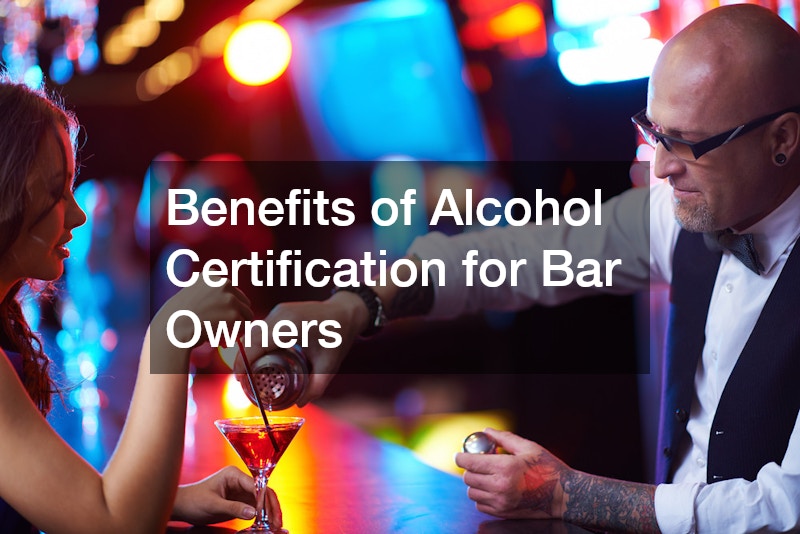This article explores the various benefits of obtaining alcohol certification for bar owners, including improved safety, compliance, and customer satisfaction.
What is Alcohol Certification?
Definition and Importance
Alcohol certification refers to the formal process through which bar owners and their staff become educated and proficient in responsible alcohol service. It is crucial in ensuring that bars operate within legal confines and maintain high standards of safety and service.
The importance of alcohol certification cannot be overstated, as it helps in minimizing risks associated with alcohol-related incidents. Furthermore, it equips staff with the knowledge to effectively manage patrons, contributing to a safer environment.
Certification programs typically cover topics like legal responsibilities, recognizing signs of intoxication, and handling difficult situations. This foundational knowledge not only supports compliance but also fosters better customer interactions.
Who Needs It?
Alcohol certification isn’t limited to bar owners alone; bartenders, servers, and even security personnel can greatly benefit from it. Essentially, anyone involved in the service and sale of alcohol should obtain certification.
Having certified personnel on staff ensures that everyone is aware of their responsibilities and complies with legal requirements. It creates a unified approach to alcohol management, reducing the likelihood of individual error.
Moreover, ongoing training and recertification can keep staff updated on new laws and best practices. This continuous learning culture not only benefits the establishment but also enhances the professional development of the staff.
How Does Alcohol Certification Benefit Compliance?
Meeting Legal Standards
Alcohol certification helps bar owners adhere to both local and federal alcohol laws, reducing the risk of fines and penalties. By understanding the legal framework, bar owners can implement policies that align with regulatory requirements.
Certified staff are better equipped to enforce age verification and manage service limits. This ensures that the establishment operates within legal parameters, preventing potential violations.
With growing scrutiny on alcohol-serving venues, maintaining compliance through certification becomes a proactive approach. It demonstrates a commitment to legal and ethical service, building credibility with regulatory bodies.
Avoiding Legal Issues
The responsibilities associated with serving alcohol come with potential legal liabilities. Alcohol certification programs provide essential training that helps bar owners mitigate these risks.
For instance, certified staff can navigate challenging situations with intoxicated patrons effectively, reducing the risk of lawsuits or fines. This proactive management can save establishments from costly legal battles.
Moreover, a well-documented and consistently enforced certification policy can serve as evidence of due diligence in the event of legal scrutiny. This can be a powerful defense in legal proceedings, showcasing the establishment’s commitment to responsible service.
Can Alcohol Certification Improve Employee Performance?
Training and Knowledge
Alcohol certification programs provide critical training and knowledge that empower employees to perform their duties effectively. They cover essential areas such as alcohol laws, customer service skills, and emergency response techniques.
Employees equipped with this knowledge can make informed decisions, enhancing the service quality and operational efficiency of the bar. This not only benefits the patrons but also improves the workplace dynamics.
Additionally, knowing that their establishment invests in their education boosts employee morale. This confidence translates into better interactions with customers, improving overall satisfaction.
Professional Development
Continuous certification offers an opportunity for professional development, setting employees on a path for career growth within the hospitality industry. It provides them with credentials that are recognized and respected in the industry.
Employees who pursue ongoing education are more likely to advance in their careers, taking on roles of greater responsibility. This benefits the bar and contributes to employee retention and satisfaction.
Moreover, having certified staff distinguishes the bar in a competitive market. Patrons are more likely to frequent an establishment where they feel staff are knowledgeable and well-trained.
Does Alcohol Certification Enhance Customer Satisfaction?
Improved Service Quality
Trained staff can significantly improve the overall quality of service offered to customers, directly impacting their satisfaction levels. Certification ensures employees possess the essential skills and knowledge to serve patrons better.
High-quality service involves understanding customer needs and responding promptly and courteously. Certified staff can handle challenging situations calmly, turning potential conflicts into positive experiences.
In turn, satisfied customers are more likely to become repeat patrons, building a loyal customer base. Word-of-mouth from happy customers is invaluable, and it can significantly enhance the bar’s reputation.
Building Customer Trust
Alcohol certification builds trust between patrons and the establishment by ensuring responsible service. Customers appreciate knowing that the bar takes their safety seriously and manages alcohol consumption responsibly.
This trust translates into customer loyalty, as patrons feel valued and respected. A bar known for its responsible practices is likely to attract a wider clientele and enjoy a positive image in the community.
By showcasing their commitment to certification, bars can differentiate themselves in a crowded market. It sends a clear message that the establishment prioritizes professionalism, quality, and safety.










